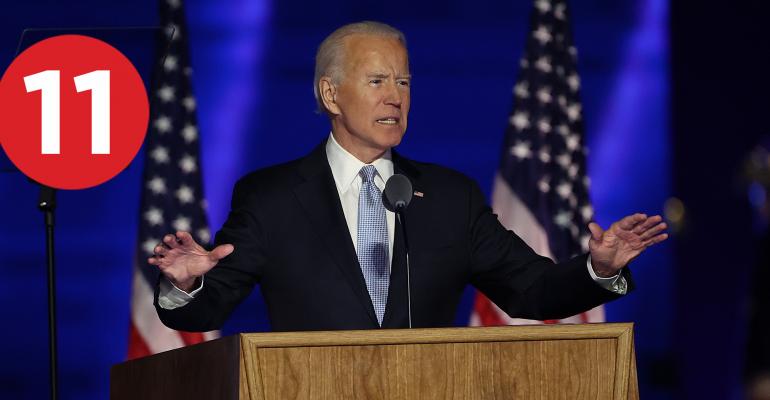- CRE Execs Weigh In On Biden, Business And The Heavy Lift Ahead “As President-elect Joe Biden began to outline his agenda for his first day in the Oval Office over the weekend, the notoriously optimistic commercial real estate industry remained true to form, saying the election couldn’t have gone better last week.” (Bisnow)
- Biden and Commercial Real Estate: 4 Intersections to Watch “The incoming Biden administration‘s decisions on a range of issues could impact the commercial real estate market and industry directly. Here are the four areas to watch as the former vice president transitions to the presidency this winter.” (Commercial Observer)
- The CRE Community Awaits a Biden Administration “And so the political contours of the next four years starts to take shape for the commercial real estate industry. Much will depend on the fate of the Senate, of course, but there are some areas that the industry can already guess will see change.” (GlobeSt.com)
- Financial world cheers the election result (and the tax increases it may impede). “In the end, though, big companies and wealthy investors seem to have landed in a sweet spot: a more predictable White House under Joseph R. Biden Jr., now the president-elect, paired with a Republican-led Senate that can ward off higher taxes or other policy changes investors find unappealing.” (The New York Times)
- What Would Divided Government Mean for Federal Housing and Transit Spending in NYC? “The balance of power in the U.S. Senate likely hinges on a pair of runoff elections in Georgia. However it tilts in the coming weeks could have a deep impact on real estate and infrastructure in the New York area.” (Commercial Observer)
- Chattanooga mall owner CBL revamps debt in bankruptcy after virus shutdowns “Analysts say company may sell or close properties, but CBL says it's not for sale.” (Chattanooga Times Free Press)
- Fashion District and Cherry Hill Mall landlord PREIT posts $30M net loss amid bankruptcy restructure bid “PREIT, owner of the Fashion District and Cherry Hill malls, reported a net loss of $29.6 million during the three months that ended Sept. 30, as it seeks bankruptcy court approval for a deal that it hopes will help it weather the current tough economic times for mall landlords.” (The Philadelphia Inquirer)
- Blackstone’s Co-Head of Real Estate describes the post-pandemic office “Many offices now sit empty as many shops hang by a thread. Casinos, hotels, and amusement parks are fading into memory as consumers turn toward socially distant activities. So what does the future of real estate—and cities—look like? That’s the question Fortune posed to Blackstone Global Co-Head of Real Estate Kathleen McCarthy.” (Fortune)
- While the Pandemic Wrecked Some Businesses, Others Did Fine. Even Great. “Perhaps most surprising: Some companies that had feared for their lives in the spring, among them some rental car businesses, restaurant chains and financial firms, are now doing fine — or even excelling.” (The New York Times)
- Ventas, GIC Form JV on Research & Innovation Centers “Ventas, Inc. has formed a joint venture with GIC that will initially own four in-progress university-based research & innovation (R&I) development projects with total project costs estimated at $930 million. The JV may be expanded to include other, pre-identified future projects.” (Connect Real Estate)
- This Buffett-Owned REIT Is Still Floundering in the Pandemic “Seritage's third-quarter results were equally awful. Total NOI declined further to $6 million, while adjusted FFO improved slightly on a sequential basis, reaching minus-$25.1 million (minus-$0.45 per share). Similar factors drove the poor results: Sears and Kmart store closures and write-offs of uncollectable rent. Increased legal costs also hurt adjusted FFO.” (The Motley Fool)
0 comments
Hide comments

